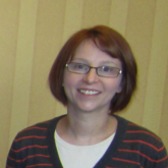

Pre-service Teachers, Other Educators
Assistant Professor of Science Education
Ms. French was on a 2012 NITARP team.
Many NITARP alumni helped us out with reviewing the NITARP 2018 proposals! Scientists who helped include Babar Ali, Calen Henderson, Tiffany Meshkat, and Julian Van Eyken. Thanks to all!
Many NITARP alumni helped us out with reviewing the NITARP 2017 proposals! Scientists who helped include Chris Gelino, Marie Ygouf, Julian van Eyken, and Jessica Krick. Thanks to all!
All four main NITARP 2013 teams submitted research proposals. Several NITARP alumni helped review them.
Ms. French got some great local coverage in the 3 Jan Times Reporter -- they made the front page!
Ms. French got some great local media coverage! (Here is a copy of the article on our server if that link doesn't work.)
As a former physics and engineering teacher, I sought research opportunities for my students. Teaching at a rural high school left me with limited access to scientific journals and lab supplies. To provide better research experiences for my students, I sought collaborations with professors across the nation. While these experiences were fantastic, my students and I primarily collected and analyzed data. I wanted to jump into a research project that went from start to finish, with all of the iterations in between. NITARP afforded me that opportunity. As a partial result of NITARP, I left my high school teaching job to pursue a doctorate in curriculum and instruction. My research focused on getting authentic science and STEM experiences into the K12 classroom. In addition to the science education focus, I also took 29 graduate hours in astronomy. I am now an Assistant Professor of STEM Education at Wilkes University where I teach K12 preservice teachers from all disciplines, as well as teach specialized courses in science education. Incorporating authentic experiences throughout all disciplines is a hallmark of my classes. Additionally, I also provide professional development opportunities for inservice teachers on how to use astronomy as a vehicle to teach STEM and how to incorporate authentic scientific inquiry in the K12 classroom. Participating in NITARP really solidified my philosophy of K12 teaching. As many previous NITARP-ers have expressed, this was a life-changing PD.
There was a nice group of people around each poster [from NITARP 2011]. The students were all very well-prepared and gave a fabulous presentation! They all fielded questions very well. It was very, very impressive to see!
While a lot of astronomy is done by computer, nothing compares to having a human look over the data.
This experience has made me conscious of how important it is to have students work with real data. I will definitely seek out more opportunities to include real data in my lessons and labs.
[This experience] has made me realize that while I use a lot of inquiry, I don’t always involve my students in the process of developing a testable question.